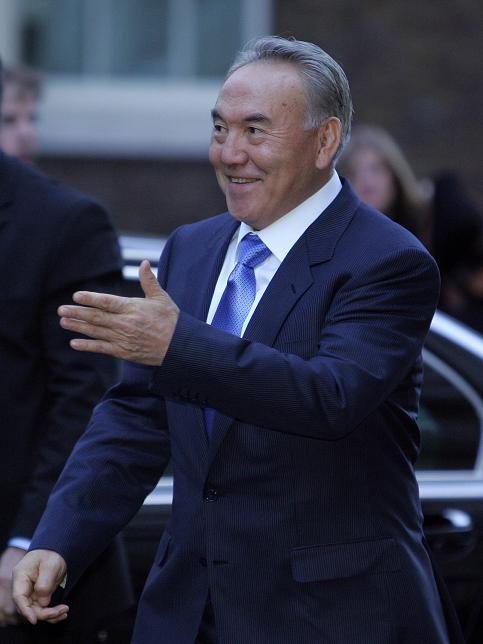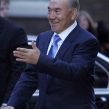
BOUCHER EXPLORES DEPTH OF KAZAKHSTAN’S SECURITY TIES WITH U.S.
Publication: Eurasia Daily Monitor Volume: 4 Issue: 114
By:

Kazakhstan has praised its bilateral relationship with the United States as having achieved a great deal in recent years. Estimating the depth and potential for strategic partnership, Kazakh State Secretary Kanat Saudabayev explained, following his meeting in Astana with U.S. Assistant Secretary of State Richard Boucher on June 5. “We have made good progress in our relations and perfectly understood these relations’ strategic aims.” Saudabayev considered his meeting with Boucher as “another opportunity to make progress in economic and security issues.”
Boucher noted that Kazakhstan appears to be making more progress toward democratizing by enhancing the role of parliament. Kasymzhomart Tokayev, speaker of the Kazakh Senate, also briefed Boucher on the nature of Kazakhstan’s recent constitutional reforms, raising hopes that the parliament will gain an increased role within the state system. Saudabayev spoke of the bilateral relationship reaching a new level. “Kazakh President Nursultan Nazarbayev’s landmark visit to Washington last September has raised our strategic partnership to a new qualitative level” (Khabar TV, Almaty/Itar-Tass, June 5).
On June 6 Boucher held talks in Astana with Kazakh Prime Minister Karim Masimov. These discussions paid particular attention to the future for economic cooperation and touched on energy issues. Washington undoubtedly has its own reasons for caution in dealing with Central Asia, given the downturn in its relations with Moscow, which is causing tension within the region. Therefore, the joint declaration signed by Kazakhstan, Russia, and Turkmenistan in May on the construction of a gas pipeline along the Caspian Sea was discussed at length. Washington has a vested interest in the reconstruction and development of Afghanistan’s energy as part of the overall strategy for reconstruction. Masimov indicated that Kazakhstan is also ready and willing to invest in the energy needs of Afghanistan, as well as providing additional support for reconstruction efforts (Interfax-Kazakhstan, June 6).
President Nazarbayev, aware of Kazakhstan’s position as a regional leader, has reiterated the idea of promoting economic and political integration within Central Asia. Clarifying that he was not offering anything new, his vision for the future of Central Asia is rooted in a Union of Central Asian States (UCAS), believing that this would offer a secure and stable regional environment. Nazarbayev first mooted this concept in 2005, but he is now touting the UCAS as a mechanism for defusing tension between outside powers and raising the international profile of the region. He did, however, strenuously deny reports that Astana is interested in entering a union with Kyrgyzstan. Nazarbayev wants the Commonwealth of Independent States (CIS) to be reformed, a theme he often raises in public discourse. He now thinks the time is right for a “breakthrough,” although he has offered no substantive proposals (RIA-Novosti, June 7).
Equally, Nazarbayev is signaling more interest in Kazakhstan’s commitment to the Shanghai Cooperation Organization (SCO) and the Collective Security Treaty Organization (CSTO). He wants to achieve greater coordination among these multilateral bodies in order to maximize the potential security dividend. “When handling security issues, the CSTO and the SCO can actively coordinate their efforts in order to more rationally use their resources, and this kind of cooperation exists already,” Nazarbayev explained.
Nazarbayev readily admitted that the focus of each of these organizations is different but not contradictory. The SCO has wider security interests, while the CSTO tends to be narrowly concentrated on military security issues. Future cooperation between the SCO and CSTO, according to Nazarbayev, should include the area of countering drug trafficking. He takes as an example the annual SCO “Kanal” anti-drug operation, which now involves law-enforcement and security services from 19 states. “A conclusion can be made that there is an exchange of operational and analytical information between the two organizations and the practice of supervising large measures to fight the drug threat,” Nazarbayev said (RIA-Novosti, June 7).
A nexus between the SCO and CSTO could be extended to include fighting terrorism, post-conflict reconstruction of Afghanistan, and strengthening the security of the Eurasian space. There are tentative moves in this direction, including a memorandum on mutual understanding between the CSTO and SCO secretariats, which is being prepared and should be signed shortly.
One important source close to Nazarbayev is Bulat Sultanov, head of the Institute for Strategic Studies under the Kazakh president. He will play a role in shaping the development of Kazakhstan’s relations within the SCO, CSTO, and bilaterally with Russia and China. Speaking at a conference in Almaty on June 5, he said, “As the situation in Afghanistan is becoming increasingly alarming and traditional and non-traditional threats are growing, I think that it is time to consider boosting relations between Kazakhstan and Russia and bringing them to the level of allied relations.” Sultanov drew attention to the possible widening of the gap in relations between Russia and the United States, “We are observing economic growth in Russia, China, and India. This cannot but influence the alignment of strategic forces in the world, the shift in policy priorities of world and regional powers, including in our region. The economic growth of these states will promote their political ambitions, and as a result a confrontation between the West and the East will be growing” (Interfax-Kazakhstan, June 5).
Sultanov’s influence, and the whole concept of devising mechanisms through which Kazakhstan may pursue closer relations with Russia and China, will become central to the conduct of Kazakhstan’s foreign policy, and it will affect how far Astana is willing to go in its relationship with Washington.




